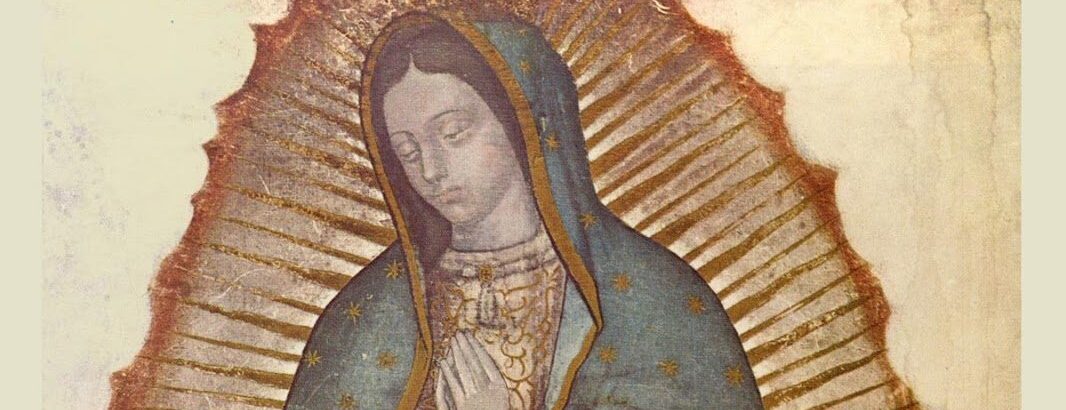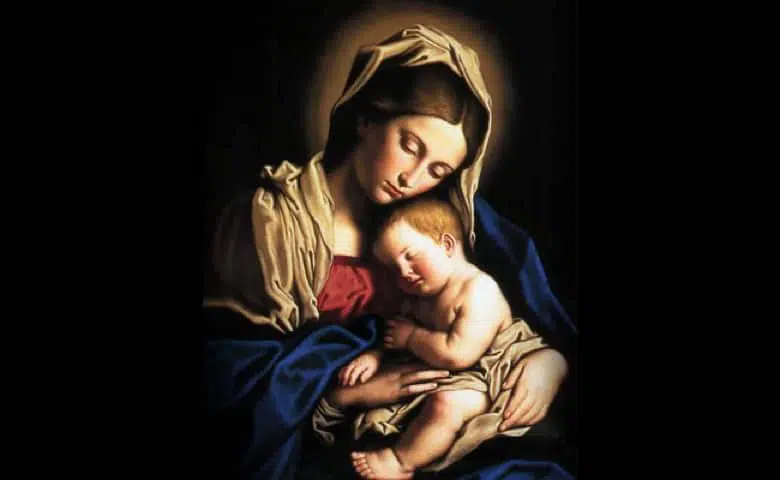The Great God-Given Dignity of Motherhood

“God’s parental tenderness can also be expressed by the image of motherhood (Isaiah 66:13; Psalm 131:2), which emphasizes God’s immanence, the intimacy between Creator and creature. The language of faith thus draws on the human experience of parents.”
― Catechism of the Catholic Church, no. 239
Christians typically speak of God as our “Father.” This is for good reason. Christ Himself spoke in His prayers to the “Father.” When asked by his apostles to teach them how to pray, He taught them a prayer that we now know as the Our Father (The Lord’s Prayer).
And yet, in his apostolic letter on the “dignity of women,” Mulieris dignitatem, Pope St. John Paul II says, “in many passages [of Scripture] God’s love is presented as the ‘masculine’ love of the bridegroom and father (cf. Hosea 11:1-4; Jer 3:4-19), but also sometimes as the ‘feminine’ love of a mother” (no. 8). He highlights several Scriptural passages that speak of God as evincing the qualities of a mother. The prophet Isaiah, for instance, wrote, “But Zion said, ‘The Lord has forsaken me, my Lord has forgotten me. Can a woman forget her sucking child, that she should have no compassion on the son of her womb? Even these may forget, yet I will not forget you'” (49:14-15).
Elsewhere, Isaiah writes this evocative passage: “As one whom his mother comforts, so will I comfort you; you shall be comforted in Jerusalem” (Is 66: 13). The Psalmist uses much the same analogy, writing, “Like a child quieted at its mother’s breast; like a child that is quieted is my soul. O Israel, hope in the Lord” (Ps 131:2-3).
As Pope St. John Paul II explains in Mulieris dignitatem, ultimately God exceeds all capacity for description. All the words that we use to describe God are at best human analogies, useful for aiding our understanding of God, but falling infinitely short of the reality. The analogies of motherhood and fatherhood, Pope St. John Paul II notes, point to the eternal “generating” which takes place within the Godhead. And yet, “in itself this ‘generating’ has neither ‘masculine’ nor ‘feminine’ qualities. It is by nature totally divine” (no. 8).
But the Scriptural authors, under the inspiration of the Holy Spirit, do not choose analogies without good reason. Each description of God’s nature is intended to draw our attention to one aspect of His being. In the passages cited above, the common theme is the extent and nature of God’s loving-concern for us. Not only can such passages help us better to understand God’s nature, but they can also aid us in better appreciating the beauty and importance of the vocation of motherhood.
God is Close to Us
Too often, we give in to the temptation to think that, because God is invisible to us, He is also remote. And yet, those who have been blessed with the gift of a loving mother know that, even should they be on the opposite side of the globe, she is in no way remote from them. Many a mother knows well the ache in the heart that comes from knowing that she cannot, at all times, be present to her children, and to comfort and soothe them in their times of distress. Even if her children are on the other side of the ocean, there is a part of her being that is with them; her thoughts and her prayers continually turn to her children.

Happy Mother’s Day to all mothers helped by our affiliates!
Every mother who has ever breastfed her baby, knows the moments of utter calm that can descend as the child takes nourishment in state of utter contentment. Often, baby and mother simply regard one another, without embarrassment, in a state of mutual affection.
As life goes on, children often turn to their fathers to help them learn to embrace new challenges. Fathers know that, in order to grow and mature, their children must sometimes take risks. Every step beyond the watchful eye and loving concern of the child’s parents is a risk, but one that must be taken if a child will become an adult. However, when some of these risks inevitably result in bumps and bruises, it is to their mothers that children often turn for comfort and reassurance.
The Scriptural authors alternatively speak of God as exhibiting the characteristics of both father and mother, because in God is to be found the ultimate fulfillment and expression of every human characteristic. Whatever good quality a human has, God possesses in superabundance. As Pope St. John Paul II put it: “Thus every element of human generation which is proper to man, and every element which is proper to woman, namely human ‘fatherhood’ and ‘motherhood,’ bears within itself a likeness to, or analogy with the divine ‘generating'” (Mulieris dignitatem, no. 8).
Thus, we have it on the highest authority, that God’s love for us is akin to the life-giving, generating love of a mother, who bends with loving concern over her child, pouring out her heart, her soul, her everything, for the sake of the child to whom she mysteriously gave the gift of life. Like a father, God stands beside us, imparting to us the courage and confidence to face the challenges of life, knowing that His strength is with us. But like a mother, God is ready and waiting to soothe our hurts, and to draw us to His embrace when we are weary, alone, or afraid.
We are Like Infants; We Need God
A mother’s love for her child is in many important ways far greater than that of the child for the mother. It is the mother who is tasked with giving nourishment and protection to the child, while the child can give nothing in return except an unformed, immature, and utterly simple affection that springs forth instinctively in the act of having its most urgent and deepest needs met by its mother.
Those of us who live in a world that prizes hyper-individuality and self-sufficiency do not like to think of ourselves as utterly helpless in this way. Instead, we prize our possession of the strength and self-assurance to chart our own course in life and take care of our own needs. As a consequence, we are ill-prepared to acknowledge and receive the maternal affection of God, which can seem a threat to our independence.
But an objective view of the matter reveals that, in fact, we are as helpless as infants in the ways that matter the most.
“And which of you by being anxious can add a single cubit to his life’s span?” (Mt 6:27) Christ asks His listeners in the Gospels. Our very existence is a gratuitous gift from God. And the Scriptures remind us continually that no amount of planning, no matter how perfect, can account for all eventualities, and extend our lives indefinitely. Death will come “like a thief in the night” (Rev 16:15; Mt 24:42–44).
More broadly speaking, our powers of vision and foresight are almost comically limited. We gaze out of our two eyes upon a tiny sliver of the totality of God’s creation. Our brains, the most complex thing in all of material creation, can only perform enough calculations to dimly foresee what might occur moments into the future. The projections of our shrewdest forecasters, relying upon the most powerful super-computers available, achieve a level of accuracy that is scarcely higher than chance.
Our culture, bereft of the “sense of God” that was near universal in previous historical epochs, looks out upon this the vastness of space and our smallness in the expanse of the cosmos, and concludes that life is absurd and that we are alone in the cosmos.
Even some of the Scriptural authors wrestled with this temptation. Solomon famously includes the refrain in Ecclesiastes, “Vanity of vanities. All is vanity.” And again, “‘Meaningless! Meaningless!’ says the Teacher. ‘Utterly meaningless! Everything is meaningless'” (Eccl 2:1-2).
Even St. Paul makes the following observation, “The things we see now are here today, gone tomorrow.” However, this great saint adds the critical qualifier, “But the things we can’t see now will last forever” (2 Cor 4:16-18). In other words, the vastness of space, the vicissitudes of fortune, the ever-proximate realities of suffering and death: these are but the outward appearances of things.
The Intimacy of God’s Presence
And yet, no less an authority than Christ Himself has assured us that God is so intimately present to us, that He has numbered the very hairs of our head.
In one of the most beautiful passages of all spiritual writing, St. Augustine reflects upon this intimacy, noting that God is “closer to us than our innermost selves.”
Allow me to quote, at length, this richest of passages from Psalm 139, which so well expresses the reality so often alluded to by the Scriptural authors, i.e. the closeness, and gentle, loving intimacy of God’s presence, which can best be described as maternal:
Lord, you have probed me, you know me:
you know when I sit and stand;
you understand my thoughts from afar. …
Even before a word is on my tongue,
Lord, you know it all.
Behind and before you encircle me
and rest your hand upon me.
Such knowledge is too wonderful for me,
far too lofty for me to reach.
Where can I go from your spirit?
From your presence, where can I flee?
If I ascend to the heavens, you are there;
if I lie down in Sheol, there you are.
If I take the wings of dawn
and dwell beyond the sea,
Even there your hand guides me,
your right hand holds me fast.
You formed my inmost being;
you knit me in my mother’s womb.
I praise you, because I am wonderfully made;
wonderful are your works!
God’s Care Reveals Human Motherhood
As already alluded to above, the beauty of meditating upon the love of God who cares for us like that of a mother is that this can illuminate the nature and dignity of human motherhood. To understand God’s maternal care is to understand motherhood in its highest manifestation, revealing to human mothers what it is that they are, and can be, to their children.
“God’s love is like the love of a mother,” said Pope Francis in a 2018 homily. “He never forgets us. Never. He is faithful to his covenant. This gives us security. … God cannot disown Himself, He cannot disown us, He cannot disown His love, and He cannot disown His people. Because He loves us, and this is the faithfulness of God.”
In one of his Angelus addresses, Pope St. John Paul II noted that God “is our father.” However, “even more he is our mother. He does not want to hurt us, He wants only to do good to us, to all of us. If children are ill, they have additional claim to be loved by their mother. And we too, if by chance we are sick with badness, on the wrong track, have yet another claim to be loved by the Lord.”

VIENNA, AUSTRIA – FEBRUARY 17, 2014: Fresco of Jesus as good shepherd by Josef Kastner 1906 – 1911 in Carmelites church in Dobling.
Unfortunately, many people’s experiences of fatherhood are fraught. Many people’s fathers were either remote from them as children, or if they were present, were excessively exacting, inculcating a sense of inadequacy and shame. This is not true fatherhood, of course. But sadly, it is a common experience.
However, for some of these, the idea of God’s maternal care can be healing: to think of God as possessing the unconditional closeness and tenderness of a mother, and the gentle healing presence, can draw their attention to qualities of God that are very, very real, and of which they stand in desperate need.
What a dismal place this world would be without the unconditional tenderness and closeness of mothers! This Mother’s Day, let us take a moment to contemplate with gratitude the mothers in our lives, and to pray for them that they may be inspired to fashion their own motherhood more and more in the likeness of God, Who nourishes, protects, and cares for His children, closer to them than they are to themselves.



